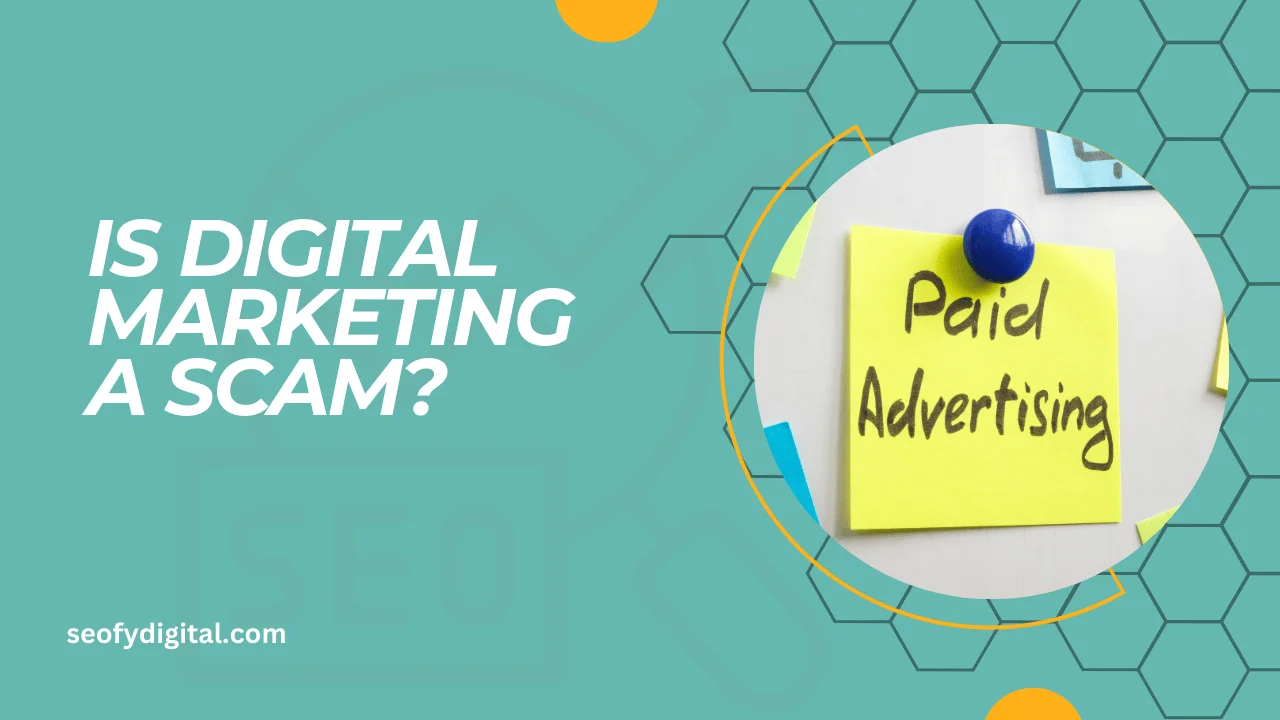You’ve seen the ads everywhere – promises of explosive online growth, skyrocketing sales, and establishing your brand as the next big thing.
It’s all thanks to the magic of digital marketing. But hold on a minute. As enticing as these claims sound, a nagging question lingers: Is digital marketing a legitimate strategy, or just a cleverly disguised scam?
This skepticism is understandable. The digital landscape is vast and ever-evolving, and countless companies make bold promises that often fizzle out. Entrepreneurs and business owners like yourself need clarity.
You’re pouring your heart and soul into your venture, and investing in the wrong marketing approach can be disastrous.
Fear not! This blog post is your myth-busting guide to digital marketing. We’ll delve into the realities of this powerful tool, expose common scams to watch out for, and equip you with the knowledge to make informed decisions for your business.
Buckle up, because we’re separating the hype from the reality of digital marketing – and showing you how to harness its true potential for success.
Contents
- 1 Understanding Digital Marketing
- 2 Common Digital Marketing Scams
- 3 How to Spot a Digital Marketing Scam
- 4 Ethical Digital Marketing Practices
- 5 Building Trust and Credibility
- 6 Conclusion
- 7 FAQ’s
- 7.0.1 How can I identify a fake digital marketing agency?
- 7.0.2 What are some common tactics used by digital marketing scammers?
- 7.0.3 How can I protect myself from digital marketing scams?
- 7.0.4 What are some ethical digital marketing practices?
- 7.0.5 How can I build trust with clients as a digital marketer?
- 7.0.6 What are the consequences of using unethical digital marketing practices?
Understanding Digital Marketing
Digital marketing is a broad term encompassing various online strategies to promote products or services. To effectively navigate the digital landscape, it’s crucial to understand key concepts like:
- SEO (Search Engine Optimization): The process of optimizing your website to rank higher in search engine results.
- PPC (Pay-Per-Click) Advertising: A type of advertising where you pay a fee each time your ad is clicked.
- Social Media Marketing: Leveraging social media platforms to build brand awareness, engage with your audience, and drive traffic.
- Email Marketing: Using email to communicate with your audience and promote your products or services.
A fundamental concept in digital marketing is the customer journey. This involves understanding how customers interact with your brand, from initial awareness to making a purchase. By effectively utilizing digital marketing strategies, you can attract, convert, and retain customers.
Common Digital Marketing Scams
Unfortunately, the digital marketing industry is not immune to scams. Some common scams include:
- Fake SEO Companies: These companies promise unrealistic results, such as top rankings in search engines overnight. They often use black hat SEO techniques, which can harm your website’s reputation.
- Social Media Scams: Be wary of offers to buy fake followers or likes, as these can damage your brand’s credibility.
- Email Marketing Scams: Phishing scams and spam emails are common in email marketing. Always be cautious of unsolicited emails and avoid clicking on suspicious links.
How to Spot a Digital Marketing Scam
To protect yourself from digital marketing scams, it’s important to be vigilant and do your research. Here are some red flags to watch out for:
- Unrealistic Promises: Be wary of any company that promises overnight success or guaranteed results.
- High-Pressure Sales Tactics: Legitimate businesses will not pressure you into making quick decisions.
- Lack of Transparency: Avoid companies that are vague about their services or refuse to provide details about their strategies.
Due diligence is essential when choosing a digital marketing agency or freelancer. Research their reputation, check client reviews, and verify their credentials.
Ethical Digital Marketing Practices

Ethical digital marketing practices are crucial for building trust and long-term relationships with clients. Here are some key principles to follow:
- Transparency and Honesty: Be upfront with clients about your services, pricing, and expected results.
- Respect for Privacy and Data: Adhere to data privacy regulations and protect client information.
- Avoiding Black Hat SEO Techniques: Avoid using unethical SEO tactics, such as keyword stuffing and link spamming.
Building Trust and Credibility
To build trust and credibility as a digital marketer, it’s important to:
- Showcase Your Work: Share case studies, testimonials, and client success stories.
- Maintain Open Communication: Keep clients informed about the progress of their projects and address their concerns promptly.
- Stay Updated with Industry Trends: Continuously learn and adapt to the latest trends and technologies.
By following these guidelines, you can establish yourself as a reputable and trustworthy digital marketing professional.
Conclusion
While digital marketing offers immense potential, it’s important to be cautious and avoid falling victim to scams. By understanding the fundamentals of digital marketing, being aware of common scams, and practicing ethical business practices, you can leverage the power of digital marketing to achieve your goals.
FAQ’s
How can I identify a fake digital marketing agency?
Look for red flags like unrealistic promises, pressure tactics, and a lack of transparency. Research the agency’s reputation, check client reviews, and verify their credentials.
What are some common tactics used by digital marketing scammers?
Common tactics include phishing scams, fake social media profiles, and misleading advertising. Scammers may also use high-pressure sales tactics and offer unrealistic promises.
How can I protect myself from digital marketing scams?
To protect yourself, be cautious about sharing personal information online, avoid clicking on suspicious links, and be skeptical of offers that seem too good to be true.
What are some ethical digital marketing practices?
Ethical digital marketing practices include transparency, honesty, and respect for privacy. Avoid using black-hat SEO techniques, misleading advertising, and spam.
How can I build trust with clients as a digital marketer?
Build trust by delivering on your promises, being transparent about your processes, and providing regular updates. Share case studies and testimonials from satisfied clients to establish your credibility.
What are the consequences of using unethical digital marketing practices?
Unethical practices can lead to penalties from search engines, damage your reputation, and harm your business. It’s essential to adhere to ethical guidelines to ensure long-term success.








